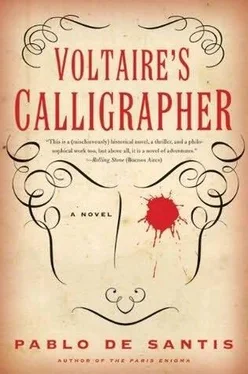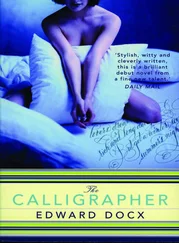The letter S in the name Sarras almost seemed to vibrate, calling attention to its deceit.
We took the key, returned the book, and stood in front of the cemetery gates a little while later, well after midnight.
Kolm refused to go in with me.
“I’m an executioner. My deal with death ends under this arch.”
He stayed to keep watch.
I walked past the headstones to where the monuments were erected. It was like being a stranger in a new land, and I tried to form a picture of the place, but the moonlight seemed to move things around. I read the inscriptions, looking for the name Sarras. The path led me to the back, where the oldest tombs were, most of them virtually in ruins, and there, at last, I found it.
On top of a small marble palace, an archangel threatened visitors with a broken sword. The rusty lock had been broken long ago. The cold, nauseating air nearly made me stumble and fall down the stairs that led inside.
Using my lamp, I lit candles that on previous nights had spilled down over coffins and altars. Not even in bright daylight would the sight before me have made sense. One of my teachers at Vidors’ School, an optician named Mialot, used to give us an exercise: he would show us blurred lines in which a message would be revealed after a while. It wasn’t concentration that let you see the hidden words but a certain inattention achieved only after a great deal of effort. Once the mystery had been solved, it was hard to believe you hadn’t seen the writing all along.
The bishop was sitting in a high-backed chair that resembled a throne. He was being supported by ropes that came down from the ceiling and made him look like a marionette. I’ve finally found the automaton, I thought. Who could mistake that for a real man? He was surrounded by enormous blocks of ice, brought down from the mountains who knows how. The candlelight seemed to imbue him with an extraordinary sense of dignity; the bishop looked like an underground monarch, capable of governing from the beyond. Anyone looking at those ropes would think they weren’t holding him up but were instead how he controlled his administration’s strategies and actions.
One by one, the candle stubs were extinguished in pools of their own melted wax. When nothing but the light from my lamp remained, I noticed the shadow of another intruder on the wall.
I had no weapon but my iron lamp and held it up toward the stranger to defend myself if he tried to prevent my escape. He was alone and stood perfectly still, as if trying to go unnoticed. Water from the blocks of ice was soaking the soles of my boots and came right up to my foe’s feet. He approached slowly, taking care not to slip and fall.
The hood fell back and revealed Clarissa’s face. It was one of those moments when you know the world is as it should be, believe everything is good, and trust you will always be safe. In between half-spoken words, gulps of air, and incomprehensible gestures, I managed to ask her what she was doing there.
“I wanted to see how my father spends his nights. Evidently he’s tired of learning from the living and now takes lessons from the dead.”
The bishop glowered at our hugs and kisses, perhaps worried the heat we were radiating would melt the blocks and cause him to fall.
A gust of wind extinguished the last flame, and the bishop was left alone in the dark. His performance would go on to the very end, when his head would drop, his arms would fall, and he would abandon what was left of his dignity and collapse with the ice floe. I pulled the iron door closed, and we walked toward the exit.
“What will you do, now that you know the truth about your father’s work?”
“Better yet: What will the truth do with me?”
The tombs looked like forgotten pieces in a bygone game. I asked Clarissa if her condition really did turn her into an automaton.
“That’s just my father’s imagination. He thinks his inventions and I are related, that we share family traits.”
“But the other night I saw you completely immobile, as if you were asleep.”
“Doesn’t everyone fall absolutely still, as if struck by lightning?” she asked. I was unable to reply when she kissed me. “Who could mistake me for an automaton?”
Kolm was waiting for us outside the gate but left before we got there, flicking his hand in a gesture of exhaustion, reprimand, boredom. We hurried back to Clarissa’s. Though we had witnessed something momentous, we spoke of inconsequential things-the silly conversations sweethearts have. A light was still on when we arrived.
“My father only ever works at night. One day he’ll go blind.”
I didn’t even glance at the inventor’s window; he meant nothing to me right then. I was saying good-bye to Clarissa without knowing for how long. She was part of a mechanism of appearances and disappearances whose frequency I couldn’t predict.
Late every night thereafter, I would tap lightly on Clarissa’s window, hoping she would open it, but she never came. Perhaps she was sleeping so soundly that nothing could wake her; perhaps her father had discovered her late night excursion and kept her locked away in a room with no windows. The house was dark, except for Von Knepper’s study. Night after night, I stayed away from his window. Then, when I had grown tired of waiting or perhaps because I had decided it was the last night I would keep watch, I peered in through a crack.
All four walls and several easels were covered in meticulous sketches of the bishop’s face, neck, and hands in various positions. The drawings were perfect, but the model had imbued them with a truth the artist hadn’t noticed: every detail-the shape of his ears, the corner of his mouth, the emptiness in his eyes-betrayed the lines of death.
The window suddenly opened and Von Knepper’s face appeared before me, looking pleased rather than angry, as if, on identical nights, he had kept watch hoping to find me.
Come in,” Von Knepper said. “Let’s speak one last time.”
He led me through rooms in shadow to the only one with any light. It was clear from the number of bolts that I was lucky enough to be invited into a place that was off-limits to others. Sketches of the bishop’s hands and face were now all around me, as if the figure of the dead man, multiplied so many times, had taken over the room. It was like being inside the bishop’s body. Von Knepper had me sit on a hard wooden chair, the one he used when working, and poured me a glass of cognac.
“I was seventeen when I began as Fabres’ disciple. I learned everything from him, but while my creatures were imperfect, his seemed alive. The differences weren’t visible to just anyone; it was in the subtleties a mother uses to tell one twin from another. I couldn’t seem to duplicate a human’s unconscious movement. My creatures were too self-absorbed.
“I did have a few successes and even managed to present one of my scribes before the czar. It was to write out a text consisting of one hundred and nine words in praise of the sovereign, but a faulty adjustment made it knock over the inkwell, and the only praise was an ink stain that spread out endlessly. If I was forgiven, it was only because a wise man believed the accident was a sign of the empire’s unlimited expansion.
“After that, I put scribes aside and went back to birds and ballerinas and mechanical jungles. As perfect as those toys were, my real ambition lay elsewhere. Those of us who practice this sorcery are obsessed with scribes. The stiller my creatures were, the more alive they seemed. Whenever they moved, a lifelessness would fall over them, dimming the light in their porcelain eyes, reducing them to but a ghost of a ghost.
Читать дальше
Конец ознакомительного отрывка
Купить книгу












